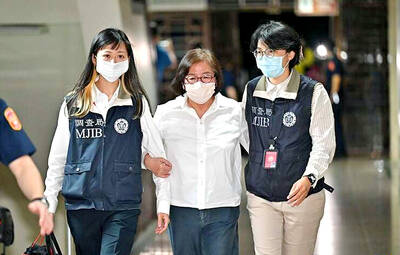Airborne pollutants from neighboring countries such as China, Japan and Korea account for more than half of those creating acid rain in Taiwan, the Environmental Protection Administration (EPA) said yesterday.
A study by the EPA on acid rain suggests that several areas in northern Taiwan have been significantly affected by air pollution, recording on average a pH value lower than 5, which is the minimum safe value according to scientists. On the pH scale, the lower the number, the higher the acidity.
At two newly established air-quality monitoring stations on the top of Yangmingshan (
Between January and July, the average acidity of rain at the two stations was 4.5pH, which is only slightly less acidic than that of vinegar.
According to scientists from National Central University and National Yunlin University of Science and Technology participating in the research, the situation could be attributed to airborne pollutants from other countries.
"Domestic pollutants don't affect the two remote air quality monitoring stations," Lin Neng-huei (林能暉), an atmospheric sciences professor at National Central University, said at a press conference held yesterday.
Lin said that about 85 percent of foreign airborne pollutants come from seven regions -- Japan, Korea, northeastern China, northwestern China, central China, southern China, the Indo-China Peninsula and the Philippines.
Acid rain is produced by the burning of fossil fuels. It is formed when emissions of sulfur dioxide and nitrogen oxides react in the atmosphere with water, oxygen and oxidants to form various acidic compounds, such as sulfuric acid and nitric acid.
"In China, about 70 percent of its energy comes from fossil fuels. Pollutants can be carried long distances by air currents to Taiwan," Lin said.
Statistics collected at 12 stations distributed around the nation show that the probabilities of the appearance of acid rain was 78 in the north, 50 percent in the east and less than 40 percent in the south.
Wu Sheng-jong (吳盛忠), deputy director general of the EPA's Bureau of Air Quality Protection and Noise Control, said that the EPA has been tackling air pollution caused by emissions from factories and automobiles for decades.
The total emissions of sulfur dioxide in Taiwan fell to 226,000 tonnes last year from 458,000 tonnes in 1991, Wu said.
In order to tackle acid rain, Wu said, Taiwan's data is shared with other countries through three international networks, including the US National Acidic Deposition Program, the Composition of Asian Deposition, and the Acid Deposition Monitoring in East Asia.
Lin said that acid rain accelerates the decay of paints and buildings and damages ecological systems.
According to Lin and EPA statistics, algae cannot survive in lakes with a pH level of less than 4.5 pH and fish will die if the pH level is less than 5.
"Acid rain is like a chronic disease that damages our environment gradually," Lin said.

Costa Rica sent a group of intelligence officials to Taiwan for a short-term training program, the first time the Central American country has done so since the countries ended official diplomatic relations in 2007, a Costa Rican media outlet reported last week. Five officials from the Costa Rican Directorate of Intelligence and Security last month spent 23 days in Taipei undergoing a series of training sessions focused on national security, La Nacion reported on Friday, quoting unnamed sources. The Costa Rican government has not confirmed the report. The Chinese embassy in Costa Rica protested the news, saying in a statement issued the same

Taiwan is to extend its visa-waiver program for Philippine passport holders for another year, starting on Aug. 1, Minister of Foreign Affairs Lin Chia-lung (林佳龍) said on Friday. Lin made the announcement during a reception in Taipei marking the 127th anniversary of Philippine independence and the 50th anniversary of the establishment of the Manila Economic and Cultural Office (MECO) in Taiwan, the Ministry of Foreign Affairs said. The decision reflected Taiwan’s commitment to deepening exchanges with the Philippines, the statement cited Lin as saying, adding that it was a key partner under the New Southbound Policy launched in 2016. Lin also expressed hope

Temperatures in New Taipei City’s Sindian District (新店) climbed past 37°C yesterday, as the Central Weather Administration (CWA) issued heat alerts for 16 municipalities, warning the public of intense heat expected across Taiwan. The hottest location in Taiwan was in Sindian, where the mercury reached 37.5°C at about 2pm, according to CWA data. Taipei’s Shilin District (士林) recorded a temperature of 37.4°C at noon, Taitung County’s Jinfeng Township (金峰) at 12:50 pm logged a temperature of 37.4°C and Miaoli County’s Toufen Township (頭份) reached 36.7°C at 11:40am, the CWA said. The weather agency yesterday issued a yellow level information notice for Taipei, New

CASE: Prosecutors have requested heavy sentences, citing a lack of remorse and the defendants’ role in ‘undermining the country’s democratic foundations’ Five people affiliated with the Chinese Nationalist Party (KMT), including senior staff from the party’s Taipei branch, were indicted yesterday for allegedly forging thousands of signatures to recall two Democratic Progressive Party (DPP) lawmakers. Those indicted include KMT Taipei chapter director Huang Lu Chin-ru (黃呂錦茹), secretary-general Chu Wen-ching (初文卿) and secretary Yao Fu-wen (姚富文), the Taipei District Prosecutors’ Office said in a news release. Prosecutors said the three were responsible for fabricating 5,211 signature forms — 2,537 related to the recall of DPP Legislator Wu Pei-yi (吳沛憶) and 2,674 for DPP Legislator Rosalia Wu (吳思瑤) — with forged entries accounting for